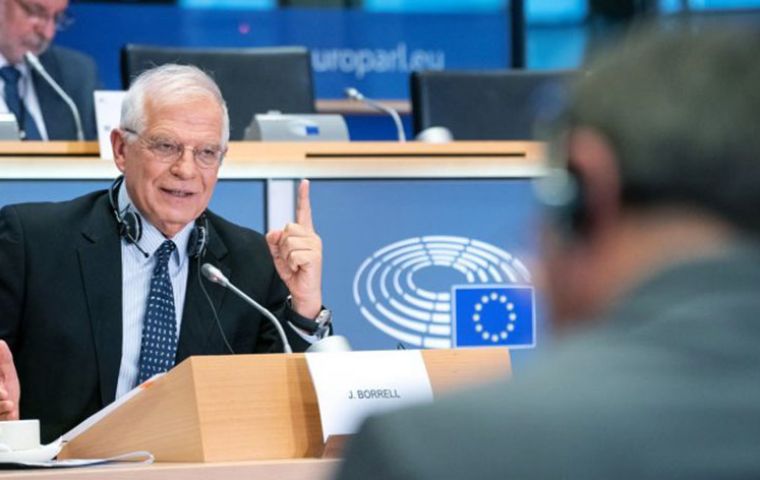MercoPress. South Atlantic News Agency
EU sanctions more Nicaraguan leaders including First Lady and vice-president
 EU Foreign Policy high representative, Josep Borrell said EU is responding to the spiraling repression in Nicaragua following arrests of presidential candidates
EU Foreign Policy high representative, Josep Borrell said EU is responding to the spiraling repression in Nicaragua following arrests of presidential candidates The 27 countries of the European Union imposed new sanctions against eight Nicaraguan leaders responsible for the deterioration of democracy in the country's institutions and for repression against the opposition. The list includes the Nicaraguan vice president and First Lady, Rosario Murillo. Juan Carlos Ortega head of the official television channel, the chief of Police, and the president of the National Assembly.
The individual restrictions punish those responsible “for very serious human rights violations or actions that undermine democracy and the rule of the Law in Nicaragua”, pointed out the EU Council in a release.
With this new batch the black listed jumps to fourteen Nicaraguan leaders in different fields. This means that these people can't have access to their assets in EU, are not allowed to withdraw funds and are banned from traveling to the EU.
EU Foreign Policy high representative, Josep Borrell said that in this way the EU responds to the spiraling repression in Nicaragua following the arrests of presidential candidates, activists, journalists and business people from the country, ahead of the coming November presidential elections.
Dictator Daniel Ortega, who Borrell criticized for having opted “for confrontation”, is still absent from the black list although the noose is tightening since among the last sanctioned are the First Lady and their son Juan Carlos Ortega, who runs the official television channel.
The other sanctioned are the president of the National Assembly, Gustavo Eduardo Porras, the Attorney General, Ana Julia Guido de Romero and the National Police chief, Juan Antonio Valle. They are considered to have played a relevant role in the repression of civil society and the democratic opposition.
The political situation in Nicaragua has increasingly deteriorated in recent months. The authoritarian hand and autocratic methods of Ortega have been in evidence through the arrest and beating of activists and journalists, including several potential presidential candidates.
The EU release also points to the political use of the judicial system to exclude candidates and ban opposition parties, which harm the credibility of the electoral system, already under checkmate by an electoral reform which has not complied with the recommendations from the EU and OAS election observers missions.




Top Comments
Disclaimer & comment rulesCommenting for this story is now closed.
If you have a Facebook account, become a fan and comment on our Facebook Page!